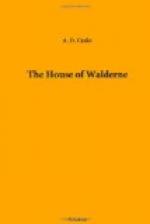A loud barking of dogs was heard, then a trampling of horses; some looked astonished, others rose to their feet, and opening the door looked out into the storm.
“What folk hast thou got there, Kynewulf?”
“Some travellers I met outside as I was returning home from the chase, having got caught in the storm myself,” replied a gruff voice; “they had seen our light, but were trying in vain to get into our nest.”
“How many?”
“Two, a knight and a squire.”
“Bring them in, in God’s name; all are welcome tonight.
“But for all that,” said he, sotto voce, “it may be easier to get in than out.”
A brief pause, the horses were stabled, the guests entered.
“We have come to crave your hospitality,” said the knight.
“It is free to all—sit you down, and in a few minutes the women will serve the supper.”
They seated themselves—no names were asked, a few remarks were made upon that subject which interests all Englishmen so deeply even now—the weather.
“Hast travelled far?” asked the chieftain.
“Only from Pevensey; we sought Michelham, but in the storm we must have wandered miles from it.”
“Many miles,” said a low, sweet voice.
The knight then noticed the woman for the first time—he might have said lady—who sat on the right of this grim king. Her features and bearing were so superior to her surroundings that he started, as men do when they spy a rich flower in a garden of herbs. By her side was a boy, evidently her son, for he had her dark features, so unlike the general type around.
“How came such folk here?” thought De Montfort.
The meal was at length served, the stew poured into wooden bowls; no spoons or forks were provided. The fingers and the lips had to do their work unaided, in that day, at least in the huts of the peasantry. Bread, or rather baked corn cakes, were produced; herbs floated in the soup for flavouring; vegetables, properly so called, were there none.
Many a time had our travellers partaken of rougher fare in their campaigns, and they were well content with their food; so they ate contentedly with good appetite. The wind howled without, the snow found its way in through divers apertures, but the warmth of the central fire filled the hovel. Their hosts produced a decoction of honey, called mead, of which a little went a long way, and soon they were all quite convivial.
“Canst thou not sing a song, Stephen, like a gallant troubadour from the land of the sunny south, to reward our hosts for their entertainment?”
And Stephen sang one of the touching amatory ballads which had emanated so copiously from the unfortunate Albigenses of the land of Oc. The sweet soft sounds charmed, although the hosts understood not their meaning.
“And now, my lad, have not thy parents taught thee a song?” said the knight, addressing the boy.




